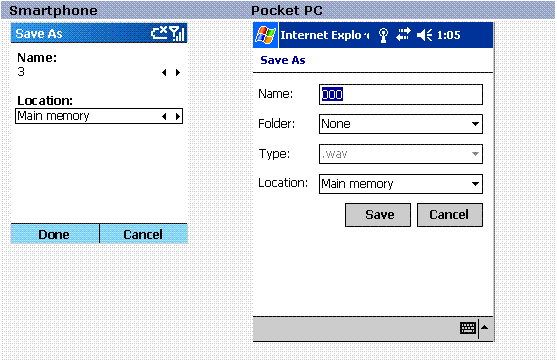 Important: Important: |
|---|
| This is retired content. This content is outdated and is no longer being maintained. It is provided as a courtesy for individuals who are still using these technologies. This content may contain URLs that were valid when originally published, but now link to sites or pages that no longer exist. |
The following illustration shows an example of the FRDM engine provided UI for the Content downloaded to the user selected SaveAsfile location.

 Image Behavior
Image Behavior
The following table shows the image behavior for the UI provided by the FDRM engine for the Content downloaded to the SaveAsfile location UI.
Note that beginning with Windows Mobile 6.5.3, soft keys are replaced by touchable tiles on Windows Mobile Professional phones.
| Item | Behavior |
|---|---|
|
SK1 |
Done. Launches content download and user sees the Download Progress UI in Image Set 16d. |
|
SK2 |
Cancel. Cancels the Change Locationand returns the user to the mobile Internet browser screen from which content was being downloaded. |
The Locationfield for this screen iterates through the list of storage volumes available on the device. Typically, the options are the following:
- Main Memory
- Storage Card
The Storage Card option does not display if there is no card available. The default locations are shown in the following table.
| Run | Default storage location |
|---|---|
|
First run |
Main Memory |
|
Subsequent runs |
Persists the last save location using the HKCU\Software\Microsoft\Internet Explorer\Main\Default Storage Location\Dialog Defaultregistry key. If the SD Card is not available, then Main Memory is always selected. |
 Note: Note: |
|---|
| devices running Windows Mobile Professional and Windows Mobile Classic have the same functionality as devices running Windows Mobile Standard with the exception of buttons instead of Soft keys. |







 See Also
See Also